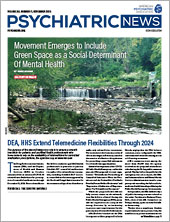Section 3 of the APA Principles of Medical Ethics With Annotations Especially Applicable to Psychiatry states, “A physician shall respect the law and also recognize a responsibility to seek changes in those requirements which are contrary to the best interests of the patient.” The requirement to respect the law has increasingly come under serious scrutiny in recent years with the enactment of laws by some states that are clearly contrary to the health and best interests of patients. Striving to uphold APA ethics principles, which apply to all APA members, psychiatrists must now confront additional challenges posed by these oppressive laws.
In this climate, knowing what is legal versus ethical can be confounding. For example, is illegal behavior also unethical or, conversely, is unethical behavior also illegal? In other words, would breaking these laws constitute unethical behavior? Where should we draw the line?
The Merriam-Webster Dictionary
defines the term “law” as “a binding custom or practice of a community: a rule of conduct or action prescribed or formally recognized as binding or enforced by a controlling authority.”
“Ethics” is defined as “a set of moral principles: a theory or system of moral values.”
Unfortunately, these definitions do not help in answering the questions I have raised. Section 3 of the APA Principles states, “It would seem self-evident that a psychiatrist who is a lawbreaker might be ethically unsuited to practice his or her profession,” especially when such illegal activities bear directly upon his or her practice. However, breaking the law by protesting social injustice may not be unethical. Likewise, breaking the law regarding speed limits and getting speeding tickets does not equate to unethical conduct. Therefore, illegal activity is not always unethical. The reverse is also true. For example, while being disrespectful and demeaning to patients is unethical, it is not necessarily illegal. That said, when unethical behavior negatively influences the care received by a patient, it could lead to a malpractice claim in civil court. Thus, unethical behavior can cross legal boundaries.
Malpractice is defined as Dereliction of Duty that Directly leads to Damages, the so-called four Ds of malpractice. Unethical behavior that negatively impacts the duty of care that the psychiatrist owes the patient and directly causes harm to the patient can result in malpractice claims. However, ethics complaints differ significantly from malpractice claims in several ways.
Malpractice claims specifically allege that a psychiatrist’s failure to provide proper care directly resulted in patient harm, while ethics complaints allege that a psychiatrist has engaged in unethical conduct, regardless of whether harm has occurred. Therefore, investigations in malpractice cases are confined to the specific intervention/behavior that caused harm, whereas ethics investigations may go beyond the substance of the original complaint if an investigation reveals other unethical conduct. Further, ethics complaints can be filed by an individual with direct knowledge of the unethical behavior, while the harmed patient, the patient’s legal guardian, and/or the patient’s surviving next of kin—that is, only those who have standing in court—may bring malpractice claims.
Importantly, standard-of-care concerns differ between malpractice cases and ethics complaints. In the former, the standard is what the “average prudent psychiatrist” would do in similar circumstances, whereas ethics complaints refer to violation of APA’s ethics code. While a patient’s desire to raise malpractice claims may be impeded by the availability of financial resources to retain legal representation, filing ethics complaints has no cost. In both cases, however, the psychiatrist may incur various types of costs. The outcome of a successful malpractice claim is financial compensation to the harmed patient at the expense and reputation of the psychiatrist, and an ethics investigation can be financially and emotionally taxing, including concerns about potential loss of license or income for serious ethics violations.
The distinction between ethics and the law is not completely clear-cut. They both hold people to account, one to members of an association (ethics) and the other to members of society (laws). Patients reserve a right to sue their psychiatrist, even for what might seem like a mild unethical behavior. Whether they prevail in court is irrelevant. Consequently, I take an extreme view when I caution myself to strive to avoid all unethical behaviors by seeing them as (potentially) illegal. I am certainly not advocating the same to all psychiatrists, but I strongly urge you to consider this view. ■

